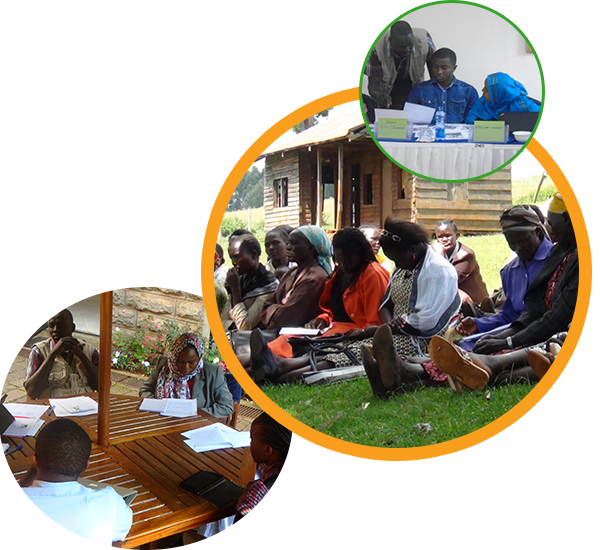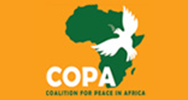Who We Are
Introduction:
The Coalition for Peace in Africa (COPA) is an African network of peacebuilders whose purpose is to promote peace, justice, human rights and development through capacity building, research and advocacy. Through this, COPA hopes to produce a critical mass of people who are capable of contributing to post-conflict reconstruction in different parts of the continent.
COPA Programmes
- Capacity building Programme
The programme is designed to offer practical support to people and organizations faced with volatile and potentially violent situations. It aims at building their knowledge, skills and confidence so that they can be a resource to each other and to their communities. In the last 10 years, the programme has trained over 1000 Peacebuilding, Development, Human rights and humanitarian practitioners in the continent of Africa and beyond. Some of the trainings have been conducted as COPA initiatives while others have been consultancies to other organizations in the Eastern Africa, the Horn and Great Lakes regions. The following trainings have been held at least once every year;
- Peacebuilding & Conflict Transformation Course (5 days)
- Monitoring, Evaluation, Reporting & Learning in Peacebuilding (5 days)
- Training of Trainers in Peacebuilding & Conflict Transformation (5 days)
- Gendering Human Security, Peacebuilding and Conflict Transformation (5days)
- Practitioners in Conflict; Refreshing Skills and creating strategies for Change (5 days)-In partnership with Peace Direct
Within Africa, participants to the trainings have been drawn from Angola, Botswana, Burundi, Cameroon, Central Africa Republic, Democratic Republic of Congo, Djibouti, Eritrea, Ethiopia, Eswatini, Ghana, Ivory Coast, Liberia, Libya, Kenya, Madagascar, Mali, Mozambique, Namibia, Nigeria, Rwanda, Sierra Leone, Somalia, South Africa, South Sudan, Sudan, Tanzania, Tunisia, Uganda, Zambia and Zimbabwe.
Selected organizations whose staff members have attended COPA trainings;
- American Friends Service Committee-Somalia & Zimbabwe
- Equal Opportunities Commission (EOC)-Uganda
- GIZ/CPS-Burundi, Ethiopia, Kenya, Nigeria, Rwanda, South Sudan,
- Network of Traditional & Religious Peacemakers organization-Somalia
- Saferworld-South Sudan and Somalia
- Social Life & Agricultural Development Organization-Somalia
- Tearfund-South Sudan, Sudan & Nigeria
- Trocaire-South Sudan
- Universities in Sudan-Al-Fasher, Blue Nile, Daraj, Diling, Gadarif, Khartoum, Nyala and Red Sea
- United Nations Assistance Mission in Afghanistan- (UNAMA)
- United Nations African Union Mission in Darfur-UNAMID-Sudan
- UNDP-DRC, Libya, Mali, Rwanda, Somalia, South Sudan, Sudan, Tanzania
- United Nations Multidimensional Integrated Stabilization mission in CAR
- United Nations Organization Stabilization Mission in DRC (MONUSCO)
- United Nations Mission in South Sudan-UNMISS
- UN Women- Burundi, South Sudan, Sudan and Tanzania
- ZOA-Ethiopia, Liberia, South Sudan and Sudan
Selected organizations that have contracted COPA to conduct inhouse/tailor made trainings;
- African Union-Peace & Security Department
- Community Organization Practitioners Association-Kenya
- Danish Demining Group-Somaliland
- Eastern Africa Standby Force Coordination Mechanism
- Intergovernmental Authority on Development-IGAD
- Oxfam-Kenya
- Social-Life & Agricultural Development Organization-Somalia
- UNFPA-Uganda
- UNDP-African Union Project/Peace & Security Project-Ethiopia
Selected quotes by some of the trainings Participants
- I am currently undertaking a PhD degree in development planning and the knowledge I got from the course has definitely contributed in enhancing my analytical skills that will be reflected in my research-Participant from Sudan in the Practitioners in Conflict; Refreshing Skills and creating strategies for Change
- My most important learning has been that we are just facilitators of change, the real experts are the people involved in the situation/conflict. Sometimes they might just lack the tools or can’t see the situation with a different lens. Our task as trainers is to facilitate this change in different ways, such as empowering them, providing new perspectives or creating opportunities of encounter and discussion -Participant from Finland in the Training of Trainers in Peacebuilding & Conflict Transformation Course
- Each and every session was a learning point for me. I liked the discussions held and examples shared, these connected the theory to the practical-Participant from Liberia in the Peacebuilding & Conflict Transformation Course
- It was a good combination between theory and practice and space for questions and discussions-A participant from South Sudan in the Monitoring, Evaluation, Reporting & Learning in Peacebuilding Practice
- I have a different perspective of security; achieving high levels of human security is the key to conflict transformation-A participant from Uganda in the Gendering Human Security, Peacebuilding & Conflict Transformation Course
- I appreciated the organizational aspects of the course from the registration, the obtaining of visas, the airport pick-up and the reception at the Convent International hotel. It was all very well planned-A training participant from Somalia
- Women in Leadership Programme
This programme aims at enhancing capacities of women and organizations targeting women in peacebuilding and political processes so that they can among other things;
- Localize UNSCR 1325 in their operations
- Raise the profiles of women peacebuilders
- Actively contribute in peacebuilding and political processes
- Advocate for women leadership and organizational and programme levels
Some of the projects that have been implemented in the programme include;
- Women in Peace Leadership (Somali and Karamoja clusters) with support from Pact Kenya/act!
- Effecting the participation of Kenyan women in peacebuilding processes with support from Zivik/Ifa
- Effecting Kenyan women participation in political leadership with support from Zivik/Ifa
- Enhancing women understanding of their women human rights with support from KIOS
- Anchoring the Participation of women in Peacebuilding processes using UNSCR 1325 with support from UN women Kenya
- Promoting Somali Women’s Leadership in Service Delivery & Participation in Political processes (in partnership with the Somali Youth Development Network) with support from UN Women Somalia
- Yearly Women Peace Tables with support from Peace Women Across the Globe
3. Trauma Awareness, Management & Resilience
This programme aims at raising awareness about the linkages between trauma and peacebuilding. It works with communities and organizations to raise awareness about trauma and its relationship with cycles of violence in their areas. Through this programme, several communities have managed to map their cycles of violence and to develop/agree on their healing strategies.
Projects undertaken under the programme include:
- Trauma Awareness and Management Project with support from Pact Kenya/act!
- A Regional trauma healing symposium with support from USAID
- A Trauma documentation (mapping cases of trauma among selected Kenyan communities) with the support of Pact
- Research, Documentation & Learning
The purpose of research and documentation is to raise the profile of peace work and practitioners in Africa by recording, collecting and disseminating positive experiences and learning, and to undertake research that lays the foundation for the formation of an African Peace Institute.
Under the programme, the following documentations have been done:
- In Search of Healers; A Study on Cycles of Violence, Collective Trauma & Strategies for Healing & Peacebuilding in Kenya
- Stories of women building Peace; Transforming Inter-Ethnic Violence in North Rift Region, Kenya
- Celebrating Grassroot women Human Rights Crusaders; the case of Baringo, Bomet, Trans-nzoia and Bungoma, Kenya
- Women in Peace leadership Programme; Stories from women Peace Leaders in Karamoja and Somali Clusters
- Women Experiences, Challenges and aspirations in the new Political dispensation in Kenya
Contact Details
Coalition For Peace in Africa-COPA
P.O Box 61753-00200 City Square, Nairobi, Kenya
Tel:+254 020 3866686/+254 703 429 667
Email:copa@copafrica.org
Website:www.copafrica.org
Physical address
Dhanjay Apartments, 3rd Floor, Suite 301/Henderd Road, Off Korosho Road, Valley Arcade-Nairobi

Expertise potential: the COPA network represents a vast spectrum of expertise in peace building and development work across the continent.
African roots: capacity to draw from traditional conflict resolution mechanisms.
Coverage: ability to reach out to a wide range of communities from the eastern, central to the southern parts of Africa and the Horn.
Our Vision
A continent anchored on a culture of peace, justice and equality
Our Vision
COPA is an African network of peace builders whose purpose is to promote peace, justice, human rights and development through capacity building, advocacy, and research and documentation.
Core Values
- Equality: Giving the opportunity to everyone to become active agent for peace, especially women and youth
- Non violence: Promoting peace and conflict transformation through non violent activities
- Inclusiveness: In our processes and communities where we work
- Integrity: In dealing with others including our partners, board and staff members
- Transparency: Integrating it in all our endeavors
- Accountability: For all our actions and activities - to our stakeholders, amongst ourselves, and our partners
